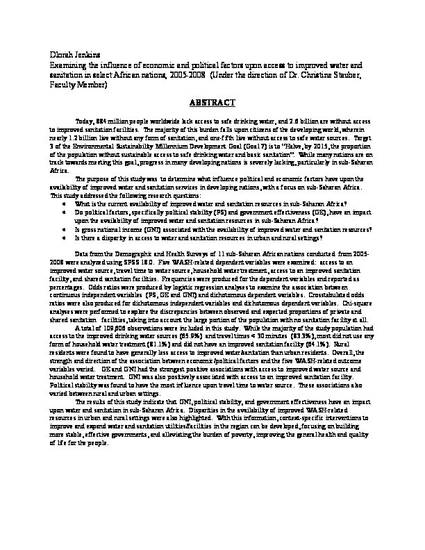
Background:Today, 884 million people worldwide lack access to safe drinking water, and 2.6 billion are without access to improved sanitation facilities, with the majority of this burden falling upon citizens of the developing world. The purpose of this study was to determine what influence political and economic factors have upon the availability of improved water and sanitation services in developing nations, with a focus on sub-Saharan Africa.
Methods:Data from the Demographic and Health Surveys of 11 sub-Saharan African nations conducted from 2005-2008 were analyzed using SPSS 18.0. Five WASH-related dependent variables were examined: access to an improved water source, travel time to water, household water treatment, access to an improved sanitation facility, and shared sanitation facilities. Logistic regression and crosstabulated odds ratios were used to analyze the associations using both dichotomous and continuous independent variables (political stability, government effectiveness, and GNI) and dichotomous dependent variables. Chi-square analyses were performed to explore the discrepancies between observed and expected proportions of private and shared sanitation facilities.
Results: A total of 109,606 observations were included in this study. The majority of the study population had access to the improved drinking water sources (65.9%) and travel times < 30 minutes (83.3%). Most used no form of household water treatment (81.1%) and did not have an improved sanitation facility (64.1%). Rural residents had enerally less access to improved water/sanitation than urban residents. GE and GNI had the strongest positive associations with access to improved water source and household water treatment. GNI was also positively associated with access to an improved sanitation facility. Political stability was positively associated with travel time to water source. These associations varied between rural and urban settings.
Conclusion: The results of this study indicate that GNI, political stability, government effectiveness, and urban-rural setting have an impact upon water and sanitation in sub-Saharan Africa. With this information, context-specific interventions to improve and expand water and sanitation utilities/facilities in the region can be developed.
Available at: http://works.bepress.com/dlorah-jenkins/1/
